|
|
|
Sort Order |
|
|
|
Items / Page
|
|
|
|
|
|
|
| Srl | Item |
| 1 |
ID:
169556
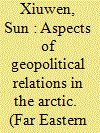

|
|
|
|
|
| Summary/Abstract |
The phenomenon of cognitive dissonance among regional and extraregional players in Arctic issues is considered, along with the reasons for it, its consequences, and measures that allow it to be reduced. The main reason for such disagreements is national identity, the categorization of which creates differences between "ours" and "theirs." It is easier for countries with similar identities to see reality the same way and develop cooperation.
|
|
|
|
|
|
|
|
|
|
|
|
|
|
|
|
| 2 |
ID:
110839
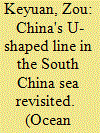

|
|
|
|
|
| Publication |
2012.
|
| Summary/Abstract |
Despite its existence on the Chinese maps for more than six decades, the U-shaped line, as a traditional maritime boundary line of China in the South China Sea, has never received a wide recognition in the world community, much less by the other claimant states in the South China Sea. The U-shaped line is a legal conundrum not only for China but also for the world community, particularly after the map with the U-shaped line, together with China's Notes Verbale with respect to the claims to the outer continental shelves made by Malaysia and Vietnam, were submitted to the UN Commission on the Limits of Continental Shelf in May 2009. This article discusses China's recent practice relating to the U-shaped line as well as the external factors that affect the validity of the line and tries to unravel the legal puzzle posed by the line.
|
|
|
|
|
|
|
|
|
|
|
|
|
|
|
|
| 3 |
ID:
122193
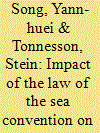

|
|
|
|
|
| Publication |
2013.
|
| Summary/Abstract |
This article examines the impact of the UN Law of the Sea Convention on conflict behavior and management in the South China Sea during four periods: during its negotiation (1973-1982); from its signing to the entry into force (1982-1994); from then until the China-ASEAN Declaration on the Conduct of Parties in the South China Sea (1995-2002); and from the setting of a timeline for outer limits of continental shelf submissions to the events following the 2009 submissions (2003-2013). Ambiguous effects were found. On the one hand, the Convention has generated or exacerbated conflict by raising the stakes, failing to resolve key legal issues, and encouraging overlapping zone claims. On the other hand, it has provided obligations, language, and techniques for conflict management and resolution. The conflict-enhancing impact was found to have been more substantial than the peace-promoting effects. Nevertheless, the balance has shifted toward more emphasis on conflict management and also some utilization of the Convention's peacemaking potential. If this long-term trend continues and the Convention is more rigorously respected and applied, the Convention may in the end be found to have contributed to regional peace.
|
|
|
|
|
|
|
|
|
|
|
|
|
|
|
|
| 4 |
ID:
148058


|
|
|
|
|
| Summary/Abstract |
The Bay of Bengal is of vital strategic, economic and maritime importance, as the Andaman Sea and the Malacca Straits link South and Southeast Asia. The Bay is intrinsically rich in hydrocarbons and minerals. Several major rivers of Asia flow into the Bay and the adjoining seas creating vast sedimentary basins that have potential hydrocarbon deposits. The growing role of the Bay of Bengal as a reservoir of vital resources has contributed to the regional powers’ ability to exert influence in this arena. The changing dynamics are particularly relevant for India and China, whose rising economies are dependent on the steady flow of resources, most importantly oil. The geopolitics of the increasingly volatile South China Sea could possibly impact on India’s interests and relations with Southeast Asian countries. This paper examines whether China and India’s Indian Ocean strategies underpin greater cooperation, rather than competition to generate synergies in the region.
|
|
|
|
|
|
|
|
|
|
|
|
|
|
|
|
| 5 |
ID:
158401
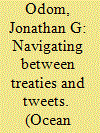

|
|
|
|
|
| Summary/Abstract |
In contemporary international discourse about maritime freedom (e.g., “freedom of navigation”), nations often speak in generalities, but rarely clarify what they mean. To reduce the risk of misunderstanding, nations should navigate their use of language between two purposes simultaneously. First, any discussion should be concise, communicable, and comprehendible. Additionally, nations should also be prepared to dialogue on these matters in greater depth and detail, and any substantive discussion should be faithful to the applicable international law that binds nations. A way to ensure such discourse is meaningful is by following a three-step process of labeling, framing, and applying. This article details this approach.
|
|
|
|
|
|
|
|
|
|
|
|
|
|
|
|
| 6 |
ID:
122192
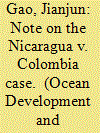

|
|
|
|
|
| Publication |
2013.
|
| Summary/Abstract |
The 2012 Nicaragua v. Colombia Case is the second instance where the International Court of Justice has employed the standard method in maritime delimitation since the 2009 Black Sea Case. The "standard method" involves three stages with the construction of a provisional equidistance line as the core of the methodology. There is no legal basis under the UN Convention on the Law of the Sea or customary law for the a priori position given to an equidistance line. Moreover, questions can be raised about the Court's operation at the second stage, which should consist of an adjustment or shifting of the provisional line rather than replacing it. Finally, the use of the disproportionality test as the touchstone for equity of the delimitation line is doubtful.
|
|
|
|
|
|
|
|
|
|
|
|
|
|
|
|
| 7 |
ID:
112476


|
|
|
|
|
| Publication |
2012.
|
| Summary/Abstract |
Seas, oceans and fisheries are probably among the most challenging natural resource systems to govern. This contribution discusses why this is so by analysing the key issues and presenting a selection of approaches to tackle them. The main recommendations are for control of illegal and open access fisheries, reduction of perverse subsidies, establishment of more marine protected areas, and proper evaluation of the importance of fisheries to future generations. Only then can fisheries be managed sustainably. The paper uses fish and fisheries in the Commonwealth of Nations to illustrate the points being made.
|
|
|
|
|
|
|
|
|
|
|
|
|
|
|
|
| 8 |
ID:
145652


|
|
|
|
|
| Summary/Abstract |
The principle of freedom of the seas remains the governing paradigm of the high seas in modern law of the sea. Although the principle, as embraced by the UN Convention on the Law of the Sea (LOSC), is no longer an absolute norm, it continues to present fundamental challenges for achieving effective conservation on the high seas as it stands in direct contrast to the conservation duty imposed on states by LOSC. The recent UN General Assembly resolution calling for the adoption of a further Implementing Agreement under LOSC to address conservation on the high seas, highlights the need to build a new ethos for management of the high seas, which will require states to loosen their firm grip on the Grotian doctrine. This article seeks to contribute toward shifting attitudes in relation to the principle of freedom through an examination of the nature and scope of the principle in its historic context and in contemporary law of the sea.
|
|
|
|
|
|
|
|
|
|
|
|
|
|
|
|
|
|
|
|
|